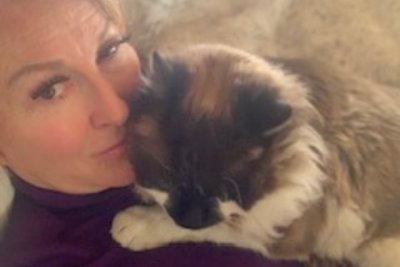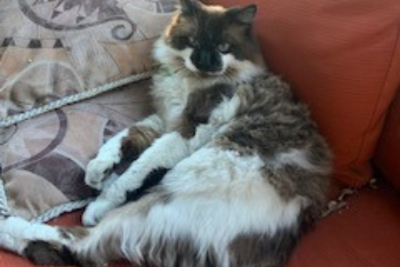My efforts at cloning my pets actually go back around 18 years. I've had three Cocker Spaniel dogs in my life and two were with me from 1990 to 2005. They were male and female and when the female died in 2004, it completely broke my heart. She became unwell and was gone in a matter of days. I looked into pet cloning, but discovered that companies doing it were just barely getting started. At that time it cost around $80,000 ($100,000 CAD). I didn't have that kind of money and there wasn't total confidence in the procedure.
Then in 2008, I acquired a Cocker Spaniel named Penny through a foster dog program and I decided to keep her. She was a year and a half old and a dear little thing who was my shadow and companion for the next 11 years. We went everywhere together and she was just delightful; very perceptive and intuitive. In 2018, Penny developed cancer and I spent $32,000 ($40,000 CAD) on her care over the subsequent seven months, but she passed in June of 2019.
Trying to clone Penny the dog
I knew about an animal cloning company in Texas, so I quickly started looking into cloning Penny. But it turned out that no one in my town, Kelowna in British Columbia, Canada had a refrigerator large enough to store a 25lb animal body. I was forced to make some accommodations in my own home but the situation was less than perfect.
Penny died on Saturday night and I took her body to my vet's office the following Monday morning for the biopsy, as it had to be completed within five days of the animal's passing.
Penny's cells were sent to ViaGen Pets in Texas who tried to culture them for about two weeks, but nothing would grow. That was a huge disappointment to me, because it was really a storage issue. I then had Penny cremated, so that was the end.
Bear the cat joins the family
About a year and half later I started to consider getting another pet and began looking around for a cat on local social media. I came across a Ragdoll cat with a big, bold, sassy look. I remember thinking: "That cat has personality!"
Bear was close to five years old when I got him in March 2021; he had been allowed out, but in my neighborhood we have racoons, and I knew from previous experiences that they would kill small cats. I wasn't going to let that happen, so I trained him from a nocturnal lifestyle to being awake during the day and I tried to cat-proof my back yard. I called it, "Bear-proofing."

I love cats so he was a great companion for me. Ragdoll cats have quite affectionate personalities and bold, sassy temperaments. They're also big and fuzzy and go limp when you pick them up, hence the name. Bear was the smartest animal I've ever owned and I've had horses, dogs and cats in my life. He was very amusing and he really figured things out on his own; there were so many locked doors and windows he managed to get through!
What I didn't realize was his need for adventure and exploring. I did take him out on a harness and lead for the first few months, but he wasn't coming back inside willingly and would scratch and claw at me.
I had been told he was streetwise; ran across streets carefully and shied away from strangers. So, after he made such an effort not to come indoors, I tried him with a harness and leash off in the back yard and got him microchipped and had two GPS devices on his collar. He was off leash by May 2021. Then, one day in January 2022, I let him out about 4.30pm and within about 20 minutes I heard something, saw cars backing up down the street and ran outside. Bear had been hit. Obviously it was my fault. I'm his guardian and I made the wrong decision, and I have to live with that.
Cloning Bear the cat and the arrival of the cloned kittens
My executive assistant and I immediately took him to an emergency vet clinic about a mile away, but by the time we got there, Bear was gone. I asked the doctor if she would do the biopsy so I could clone him, but she refused. So I had to take him home, put him in an extra fridge I had and store him overnight until I could get to my regular vet in the morning.
It was only three years prior that I had done the research into cloning Penny so I still had all the relevant emails on my phone. I had the front office of the vet clinic print out the details for the biopsies and give them to the vet. At that point I knew the cost, but pricing was not at the forefront of my mind. I'm not a wealthy person, but I don't see dollar signs when it comes to care of my pets. I knew it would cost $35,000 ($50,000 CAD) but that was irrelevant.


My regular vet was able to do the biopsy and they ensured that Bear's cells were packed at the appropriate temperature and in the right packaging. Those cells had to travel more than 2,000 miles to get to Texas, so I was hugely nervous.
I sent the package on February 1 and they received it on February 2. The lab staff told me it was the right temperature but it took 10 days before they were able to report to me that they had been able to culture 4 million cells, which have been stored in cryogenic freezing facilities. Now, I just have to wait until my name comes up on their wait list. They have a waiting list of six months so I'm expecting to hear from them in August time.
In order to create the clone embryo, the nucleus is removed from an ovum from a donor cat and DNA from Bear's cells is inserted. When that happens, the egg is fooled into thinking it has been fertilized. The embryo transfer takes place, and the fertilized ovum goes into the surrogate mom cat. After a gestation period of around 63 days, between one and three kittens will be born. ViaGen has a facility in Rochester, New York, which is where, at eight weeks old, they will be given to the me. I haven't really imagined the moment of meeting them because I don't really want to get my hopes up that this first pregnancy is going to work. I just want to take it one day at a time, but I will be curious and excited in November.
Cloning instead of pet adoption
I would much rather replicate Bear's genetic material into another cat than adopt again because I would love to see the personality of Bear live on. He was the most brilliant animal I've ever owned. Research tells us that a significant portion of personality is carried in genes so I'm willing to take the chance. I've said before that Mother Earth is not finished with Bear and Bear is not finished with Mother Earth. So, if I can bring back his genetic material in the form of another cat, I would like to do that. If their personalities are a little different, that's OK, I'll be happy regardless.
I actually met a cloned dog three years ago. I had asked ViaGen if they had any clients in my province and got permission to contact a man who had cloned his dog.
By this time the original dog had passed, but the owner and I were sitting at his kitchen table watching the cloned puppy running along the furniture barking at a senior dog. This man then showed me a video of the original dog running along the furniture barking at the senior dog. The dogs looked identical. I asked how close the clone was to the original dog in temperament and personality, and the owner said about 95 percent.
Having a pet is the closest thing to having a child that I have experienced, so I see cloning my cat rather than adopting another as similar to human parents who want to go through IVF rather than adopt. I am able to maintain healthy boundaries around being a pet parent; I don't become as emotionally involved as a human would with a child. But, I love my pets enough to appreciate their presences, care for them and provide them with everything they need to make sure they have a healthy, interesting life.
It's not the same as having a child, but I don't have children, so a pet and feeling attached to a pet is the closest thing to having a child that I can ever know.
Kris Stewart is the CEO and clinical director of Advanced Home Care Solutions Inc. She lives in Kelowna, British Columbia, Canada.
All views expressed in this article are the author's own.
As told to Jenny Haward.
Uncommon Knowledge
Newsweek is committed to challenging conventional wisdom and finding connections in the search for common ground.
Newsweek is committed to challenging conventional wisdom and finding connections in the search for common ground.





